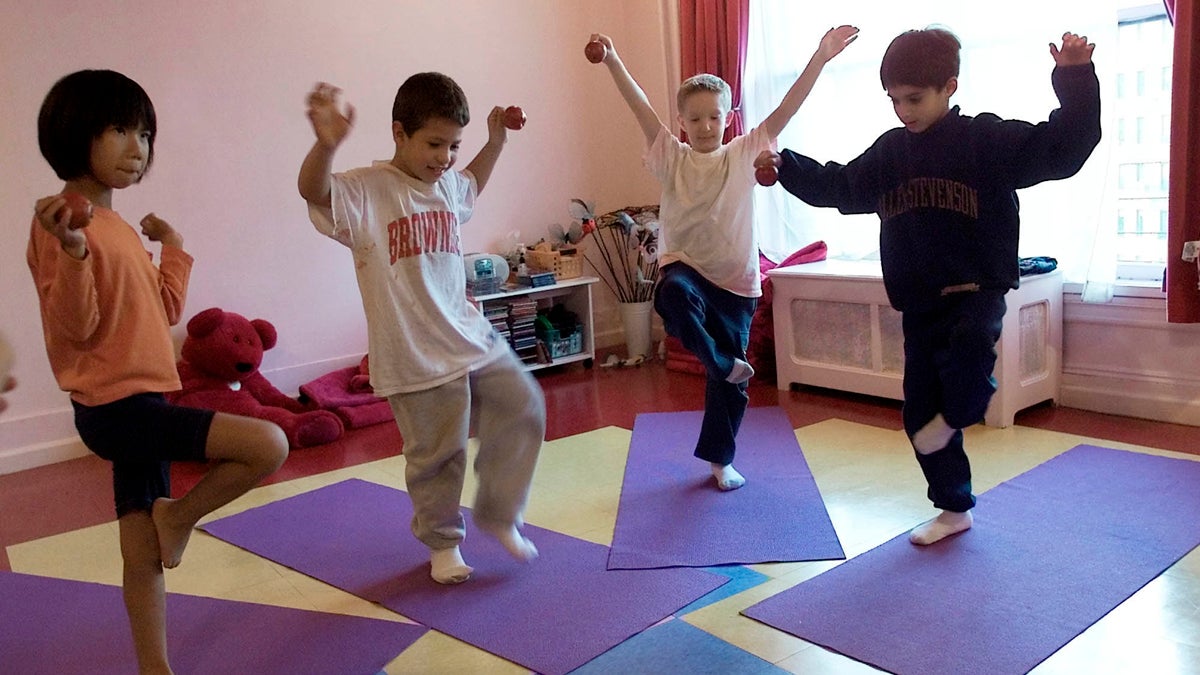Schools experimenting with meditation as an alternative to detention
Listen
(Beth A. Keiser/AP Photo)
What if every time a kid acted out, he got sent to take some deep breaths, instead of detention? Well a program in Baltimore has been trying that out for the past few years, with good results. The school’s suspension rate has dropped — to zero.
“Inhale in deep, exhale it out,” says 9 year old Dacari Crawford. He’s demonstrating how to meditate.
The mostly empty room in Baltimore’s Robert W. Coleman Elementary School looks a bit like a new-age spa.
“And you keep doing that until you feel perfectly calm to go back upstairs and do your work,” said Dacari as he finishes the lesson.
He’s sitting on one of the miniature meditation pillows on the floor.
Behind him are a table and chairs for conflict resolution. There’s even a diffuser for essential oils.
Jamar Peete is a “mindful moment teacher” here, funded by The Holistic Life Foundation, “ a non-profit that brings meditation and mindfulness to underserved communities.”
Peete says Dacari used to resist when adults tried to discipline him. Dacari admits he had a bad temper.
“It was like one time, when I was mad at the teacher, the kids in the classroom, I was so mad, I flipped all the desks and chairs,” explained Dacari.
After that incident, Dacari’s teacher sent him to the mindful moment room. “They brought me down here, I was screaming and yelling, the told me take a lot of deep breaths.”
The meditation room isn’t about punishment. It’s about helping the child calm down and come back into himself. The school uses this method first, even for more serious problems, like when there’s a fight. After that step, if necessary, the principal follows up with the student.
The facilitators talk through situations with kids in a relaxed way. Together, they find a solution.
Baltimore’s Coleman Elementary is a Title 1 school, which means many of the families here are low income. And a lot of the kids have been through difficult experiences.
“Trauma is real, it’s around us, it’s in our communities,” said the school’s principal Carlillian Thompson. She says the Holistic Life Foundation takes that reality into account.
“Their whole mission is to say to children” yes, this might be right here, you might be facing this situation…you could be facing knowing that somebody you loved was killed, or you saw somebody’s house burn down, or you experienced a situation that caused you to be upset or frightened. If you focus on yourself, and if you breathe and you meditate, it will help you get through any situation.”
After coming here when he needs to calm down for the past few years, Jamar Peete says things have changed for Dacari.
“It’s like he’s slowed down a little bit,” he said.
That doesn’t surprise Professor Patricia Jennings, an associate professor of education at the University of Virginia. She studies how mindfulness can create more tranquil and more productive students and teachers.
She says kids growing up in poverty, who have more exposure to trauma and toxic stress, can become more reactive.
“Their nervous systems develop in a way that’s adaptive in those contexts, but not so adaptive in school. That kind of reactivity or over-reactivity can cause a lot of problems with learning.”
It can also make kids more conflict prone – because they’re reacting more strongly to everyday events. Say a kid bumps into them in the hallway, they may interpret that as intentional aggression, Jennings said.
Traditional punishment, like a detention or a suspension, can reinforce the idea that a kid is bad. Chances are, the kids is already feeling bad about himself, she said, so it’s likely they’ll act out again.
“Mindfulness rooms, where kids have a chance to cool out, really settle themselves, and then have a caring adult help them think about what happened and really helped them solve the problem in a calm way, rather than an over reactive, punishment way, can be really helpful.”
She says that’s because two things are happening– one, kids are learning to self-regulate, and two, they’re seeing that an adult cares about them and will work through something with them. In her eyes, It’s a win-win.
At El Centro de Estudiantes High School in North Philadelphia, students have had largely negative experiences with traditional schools, said their principal JuDonn DeShields.
“Many of our students come to us and say, “I was someone who fought in my previous school, I was someone who was bullied, I was someone who was constantly suspended or expelled,” DeShields explained.
He and other teachers work with students to create consequences, but also to keep them engaged in school. It’s more about repairing what was broken, and less about traditional punishment, he said.
“If you make a mistake or if you display misconduct, it’s not the end of the world, like, there is an opportunity to make things better and to restore yourself to the community,” he said.
DeShields is interested in employing mindfulness techniques with his students, which the school already uses in their gym classes, thanks to donated yoga balls and mindfulness manuals from the Children’s Hospital of Philadelphia.
Some kids think it’s a little silly, but he thinks the students would benefit overall.
“I think the big thing with meditation and mindfulness, is that it allows students to slow down their thinking process, which allows them to then make choices that are going to put them in the best possible place,” said DeShields. He says much like the kids at Coleman Elementary in Baltimore, mindfulness could allow his students to slow down, and make better choices.
WHYY is your source for fact-based, in-depth journalism and information. As a nonprofit organization, we rely on financial support from readers like you. Please give today.

